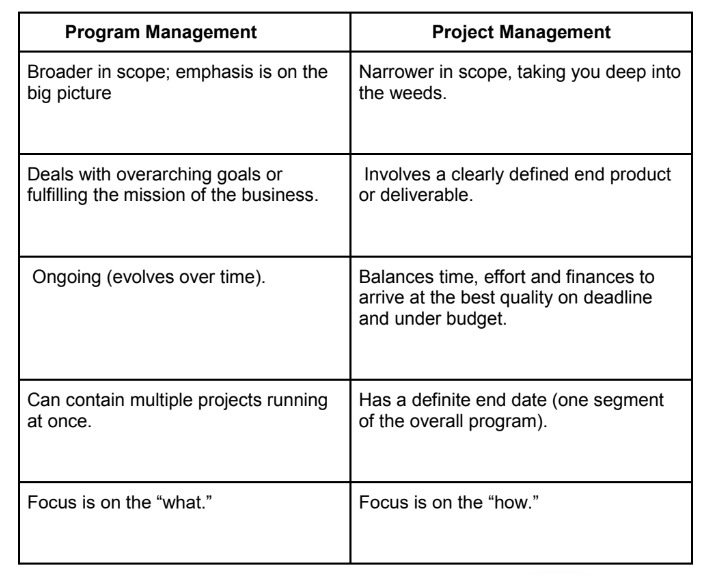Program Management vs Project Management
home / Program Management vs Project Management
Program Management vs Project Management
To comprehend the distinctions between program and project management, it is necessary to first comprehend the distinction and difference between a program and a project.
A program is a large project that is made up of several smaller projects that are dependent on each other. Because programs are so huge, they are frequently administered by a group of people, with projects and tasks allocated among them. Outlining objectives, planning execution, managing operations, and reporting on status are some of the functions involved in beginning a successful program.
Projects are typically smaller in scope, and they frequently have financial, time, and resource constraints. The objectives of a program are usually centered on a company mission or overarching goal, whereas project goals are usually short term.
Now that you know the difference between a program and a project, what is program management vs. project management?
Project management. Program management. They sound similar, and they are complementary. But the roles are distinct, with different responsibilities and processes.
The Difference Between Program Management and Project Management?
Project management is overseeing the specifics of completing a set of tasks with a specified goal in mind. Building a new storefront is an example of a project. Several projects are frequently included in a single program. Projects include the following characteristics:
● The budget is clearly defined at the outset.
● They have a specific deliverable, such as building a new bridge or creating a database.
● Their completion should occur within a designated time frame.
● They are temporary in that they have a defined beginning and end.
Program management is the process of overseeing long-term goals that are fulfilled through a series of projects. Projects are a subset of programs. Stormwater management is an example of a program; some projects under that program would include 1- repairing storm drains and 2- installing new backflow valves.
Some characteristics of programs are:
● They align with the organization’s larger strategic goals.
● They typically don’t have a set end date; the benefits they deliver are ongoing, as is their time frame.
● Their budget is defined by the organization’s financial calendar, with new funding being supplied periodically.
● They are managed at a higher level with regard to the organization’s goals; program managers are closely tied to strategy.
How Program Managers Operate
Program managers must think strategically, especially since they frequently negotiate between numerous organizations—and in some cases, multiple projects—that are interacting because of the program.
The program manager sets the vision, which is especially important when he or she is overseeing several projects at once. Each project is a cog in the wheel to keep the program rolling.
Program managers define programs and their objectives, measuring how those objectives will affect their organization. They then devise strategies to realize the defined program
objectives. This involves identifying and overseeing a host of projects structured to achieve the program’s goals.
How Project Managers Operate
Project managers play the lead role in planning, executing, monitoring, controlling, and closing out projects. They are accountable for the entire project scope, the project team and resources, the project budget, and the success or failure of the project.
They begin by drawing a project “road map” that details project tasks and the time frames in which team members will complete them. Well-planned road maps coordinate the various skill sets of team members, so they serve cross-functional purposes.
Project managers coordinate the resources required to complete project activities and ensure that all work is completed in accordance with program criteria. They also guide their team members through each project stage’s execution.
As projects progress, project managers monitor and help resolve any bottlenecks to avoid delays.

As you can see, program and project management are not the same thing. In general, program management involves far greater big-picture, strategic, corporate execution at a senior level, with a larger impact on the company’s finances and achieving business goals.
Project management sticks closer to immediate tasks, timelines, and the goals of the project.
If you are interested to get benefits from our services, contact us now!
Take your business to the next level and get professional and digital solutions to serve your interests!
Some References: